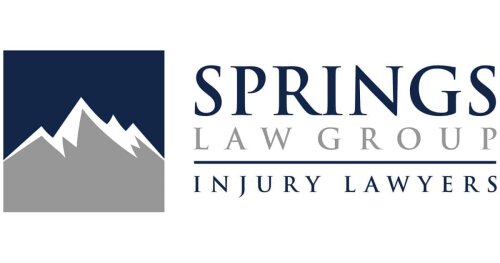Best Animal & Dog Injury Lawyers in Colorado
Share your needs with us, get contacted by law firms.
Free. Takes 2 min.
Or refine your search by selecting a city:
List of the best lawyers in Colorado, United States

About Animal & Dog Injury Law in Colorado, United States
Animal and dog injury law in Colorado primarily deals with legal issues arising when individuals are injured by animals, with a strong focus on dog bites and attacks. This area of law covers situations where a person is bitten, scratched, or otherwise harmed by another person’s pet or animal. The laws are meant to balance the responsibilities of pet owners with the rights of those who suffer injuries. Colorado statutes and local ordinances govern liability, safety, and procedures following such incidents.
Why You May Need a Lawyer
You may need a lawyer if you or a loved one has been injured by a dog or another animal, or if your own animal has injured someone. Common situations include:
- Being bitten or attacked by a neighbor's dog
- Children injured by an uncontrolled pet at a park or public place
- Delivery workers bitten while performing their job
- Dog-on-dog attacks resulting in injury or the death of a pet
- Disputes or legal claims about ownership, control, or containment of the animal
- Facing criminal or civil liability if your animal injures someone
A lawyer can help you understand your legal rights, negotiate with insurance companies, file claims, deal with medical expenses, and pursue compensation for injuries. They can also defend you if you face allegations regarding your own animal.
Local Laws Overview
Colorado's local laws concerning animal and dog injuries are a mix of state statutes and municipal ordinances. The key aspects include:
- Strict Liability for Dog Bites: Colorado has a strict liability statute for dog bites. This means the owner is usually responsible if their dog bites someone who is lawfully on public or private property, regardless of the dog's prior behavior or the owner's knowledge.
- “One Bite” Rule Does Not Apply: Unlike some states, Colorado does not require proof that the dog has bitten someone before or that the owner knew the dog was dangerous.
- Exceptions: The law does not apply if the victim was trespassing, provoking the animal, involved in criminal activity, or a veterinarian treating the dog.
- Dangerous Dog Laws: Local governments may label dogs as “dangerous” or “potentially dangerous,” with restrictions and requirements for the owner.
- Reporting: Dog bites must be reported to local animal control or law enforcement, which may investigate or impose quarantine.
- Damages: Victims may recover economic damages like medical costs, lost wages, and in some cases, non-economic damages for pain and suffering.
Because city and county ordinances can add further rules, it is important to check local regulations in addition to state law.
Frequently Asked Questions
What should I do if I am bitten by a dog in Colorado?
Seek medical attention immediately. Report the bite to local animal control or law enforcement. Document your injuries, gather witness information, and try to get the dog owner's contact details.
Can I sue the dog owner for my injuries?
Yes, Colorado law allows you to file a civil claim against the dog owner for damages you suffered as a result of the bite or attack.
Does it matter if the dog has bitten someone before?
No, Colorado is a strict liability state, so prior incidents or knowledge of dangerousness are not required for the owner to be liable for medical damages.
What defenses might a dog owner have against a bite claim?
An owner may argue the victim was trespassing, provoking the dog, or engaged in criminal activity at the time of the incident.
Is there a time limit for filing a claim?
Yes, the statute of limitations for personal injury claims in Colorado is generally two years from the date of the injury.
What compensation can I receive?
Economic damages like medical expenses and lost income, and in certain circumstances, non-economic damages such as pain and suffering.
What if my own pet was injured or killed by someone’s dog?
You may be able to pursue compensation for the veterinary expenses, loss of the pet, and property damage under Colorado’s laws. A lawyer can help evaluate your specific case.
Will the dog that bit me be put down?
Not necessarily. Animal control will investigate, and action depends on the severity, the dog’s history, and local laws. The owner may have to comply with restrictions or training requirements.
What happens if I was working when I was bitten?
You may have claims both through your employer’s workers’ compensation insurance and against the dog owner directly.
Do leash laws affect my case?
Yes. Violations of local leash laws may be evidence of negligence or increase the dog owner's liability.
Additional Resources
If you need more information or help, the following resources can provide guidance:
- Colorado General Assembly: State statutes concerning animals and dog bites
- Colorado Department of Public Health and Environment: Rabies and bite reporting
- Your local city or county animal control division
- Colorado Bar Association: Lawyer referral services and legal clinics
- American Veterinary Medical Association: Animal safety and prevention tips
Next Steps
If you have been involved in an animal or dog injury incident in Colorado, consider taking the following steps:
- Seek immediate medical attention for any injuries
- Report the incident to local animal control or law enforcement authorities
- Document the incident with photos, medical records, witness statements, and any relevant details
- Consult with a specialized attorney to discuss your case and determine your legal options
- Keep records of all communications and expenses related to the injury
Legal consultation is often free for personal injury matters, so do not hesitate to speak with a lawyer to understand your rights and the appropriate actions based on your unique situation.
Lawzana helps you find the best lawyers and law firms in Colorado through a curated and pre-screened list of qualified legal professionals. Our platform offers rankings and detailed profiles of attorneys and law firms, allowing you to compare based on practice areas, including Animal & Dog Injury, experience, and client feedback.
Each profile includes a description of the firm's areas of practice, client reviews, team members and partners, year of establishment, spoken languages, office locations, contact information, social media presence, and any published articles or resources. Most firms on our platform speak English and are experienced in both local and international legal matters.
Get a quote from top-rated law firms in Colorado, United States — quickly, securely, and without unnecessary hassle.
Disclaimer:
The information provided on this page is for general informational purposes only and does not constitute legal advice. While we strive to ensure the accuracy and relevance of the content, legal information may change over time, and interpretations of the law can vary. You should always consult with a qualified legal professional for advice specific to your situation.
We disclaim all liability for actions taken or not taken based on the content of this page. If you believe any information is incorrect or outdated, please contact us, and we will review and update it where appropriate.
Browse animal & dog injury law firms by city in Colorado
Refine your search by selecting a city.










